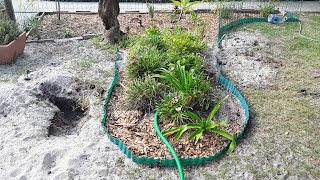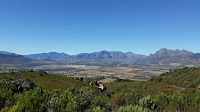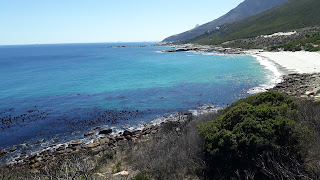The hiking schedule said Paarl Mountain, followed by a little picnic, then Paarl Rocks. Anyone who has ever been to Paarl knows that it can be one of the hottest places in the Western Cape, and despite it being the end of March, today was scheduled for a hefty 35 degrees (in the shade). I pondered briefly on whether to go or not, but quickly decided that 'fair weather' hiking would soon lead to the slippery slope of non-attendance (in my case, anyway) and the benefits far outweigh any slight discomfort at the time.
So I set the alarm for 5.30, woke up at 3.30 and lay awake waiting for the alarm. I reached the mutual meeting point in Constantia at 7am with minutes to spare and we set off for Paarl in heavy morning traffic, taking an hour and a half to get there, still before the heat set in. Incredible views stretched before us - an endless row of dragon's teeth from north to south, enticing adventure beyond, and the entire Cape Peninsula from Cape Point to Table Mountain to the west. That in itself made the trip worthwhile.
After a quick snack in the shade of unidentified but impressively spreading trees at the strangely named Krismis Kamp, we set off along the gravel road to do a circular walk that would bring us past the gigantic granite outcrops. A very light breeze at the top of the mountain brought slight relief, and apart from a lizard or two and some distant birds, no other life stirred on that warm hillside. We eventually descended a very steep path - meaning that a very steep climb lay ahead - down to a babbling stream. A number of dams in the hills are fairly full, so either they are not being drawn from, or there has been sufficient moisture over the area to keep them filled.
The very steep climb back up the hill helped with the cardio and calorie burn, and we sat down to a very welcome picnic lunch under the same spreading tree, feeling fully justified in enjoying Scotch egg, pork pies, sandwiches, fruit, coffee and beer after our strenuous 5km walk. It was then off to climb the Rock!
We drove up the winding road to the very foot of the exposed granite - there was no way we could have hiked up from the picnic area - and set off to climb what is basically a round rock, with the aid of a fixed chain rail at the steepest part. It is unlikely that many people would make it up there without the chain as support, and I must confess that I trailed in the rear as the rest of the party tramped unconcernedly to the summit. I paused for breath and to admire the view many times on the way up and the group photo shows just how I felt when I got there!
However, recovery was quick due to increasing fitness as the weeks go by, and the trip down was a doddle. We passed a man clinging to a cliff face - it was quite frightening to imagine ourselves in a similar position, but he was doing it for fun.
That's another one off the bucket list. I must say I didn't enjoy being on the side of a round rock as vertigo is never far away, and I may not do it again. But never say never.





















































